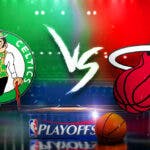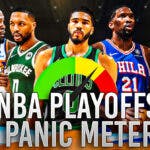It was late in the winter of 2010 that the Miami Heat found themselves at a crossroads. For all their talk just a few short months before, of bringing numerous titles to South Beach, thanks to a roster that featured LeBron James, Dwyane Wade and Chris Bosh, the “Heatles” would struggle out of the gate to a pedestrian 9-8 record; failed, by an offense that seemed to run on the principle that the three stars should take turns scoring the basketball. It was during a November game against their eventual Finals opponent, the Dallas Mavericks, that it all came to a head, with a visibly frustrated James bumping head coach Erik Spoelstra, after an emergency timeout following a Mavericks' run.
Though the matter would be brushed off as unintentional by the Miami organization, as well as LeBron's camp, Pat Riley would later reveal that the incident was in fact a precursor to a meeting in which the four-time MVP would hint at his desire to see Spoelstra removed, and Riley installed in his place. Having long mentored the coach, Riles dismissed James' entreaty and instead backed Spoelstra in a move that secured the then-40-year-old's place on the Heat's bench for the remainder of the trio's run. It was a moment that was significant, not only because it established a clear hierarchy in Miami that proved essential to the Heat's eventual success, but because it established Spoelstra as an asset the organization was not willing to give up, whatever the public perception might be.
10 years later, the once embattled coach has repaid their faith by quietly becoming the best in the NBA.
Up two games to none in their best-of-seven matchup against the Boston Celtics, Eric Spoelstra has succeeded not only as a result of the brilliant schematics for which he was previously known, but for his ability to establish a winning culture within the organization; a prospect that looked dubious at best during the nadir of the early LeBron era. Once again attracting a top-line free agent in Jimmy Butler, Spoelstra and the Heat have succeeded in part because of their insistence that Butler adapt to Miami, rather than the organization rebuilding itself to accommodate the forward. Spo's willingness to challenge Butler while still creating buy-in from the notoriously difficult player, demonstrates the level of credibility the former video coordinator has obtained within the league.
Yet, his greatest accomplishment may be his work in helping develop top-tier talent, despite the Heat not possessing the type of lottery picks usually considered essential in obtaining such young players. From Tyler Herro, to Duncan Robinson, to Bam Adebayo, Miami is two games away from the Finals largely because of Spoelstra helping to expand these players' skill sets, beyond the one-facet they were previously known for. While the Heat utilize a scheme built around the frenetic energy each of these players provide—featuring an array of off-ball cuts and dribble handoffs—they have succeeded because they have proven capable of adjusting, even when their opponents dictate the action; this versatility being a key hallmark of Spoelstra's work.
If it's the duty of a coach to prepare his players to succeed in the position he places them in, then Eric Spoelstra stands alone.




